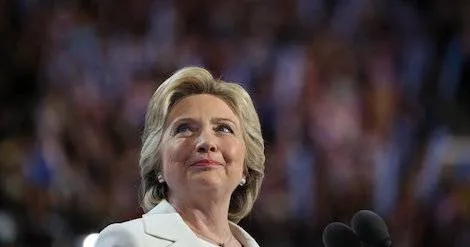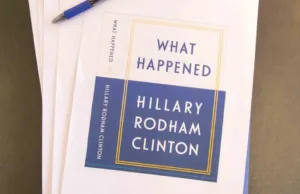
Why Hillary Clinton’s WHAT HAPPENED is a Historically Important Book
 Let me tell you why that’s some sexist, history-burying bullshit.
You don’t have to like Hillary Clinton to objectively understand that being the first female candidate for a major political party in the United States of America is a historical achievement that will be discussed in decades to come. You don’t have to like Hillary Clinton to recognize that sexism is still a massive problem in every single society in the modern world and that its continued existence in the US influences other countries and how women are treated in those countries. You don’t have to like Hillary Clinton to understand that the US has never had a female president. Yup, out of 45 American presidents, there are three dudes named George, but exactly zero women.
The historical significance of how far Clinton got in the race (including winning the popular vote) cannot be erased, even as people attempt to paint her as someone who was too ambitious to be president. It is simply Clinton’s right as a person with a voice to write about her experiences and share them with other people. Donald Trump cannot stop slandering her and what her campaign was about–I would say he is worryingly obsessed with blaming her for his own shortcomings–so I would say that Clinton has more than a right to contribute to the post-election narrative. She has the duty to set the record straight, to tell all about things the public and the media might have missed.
With all of this being said, the most important reason for the publication of Clinton’s book is its historical significance for generations to come. The thing about being the first female presidential candidate for a major party is that it comes with uncharted territory, something even Democratic strategists struggled with, within the campaign. A New York Magazine profile of post-election Clinton detailed the issues being a pioneer in this area created for the campaign:
Let me tell you why that’s some sexist, history-burying bullshit.
You don’t have to like Hillary Clinton to objectively understand that being the first female candidate for a major political party in the United States of America is a historical achievement that will be discussed in decades to come. You don’t have to like Hillary Clinton to recognize that sexism is still a massive problem in every single society in the modern world and that its continued existence in the US influences other countries and how women are treated in those countries. You don’t have to like Hillary Clinton to understand that the US has never had a female president. Yup, out of 45 American presidents, there are three dudes named George, but exactly zero women.
The historical significance of how far Clinton got in the race (including winning the popular vote) cannot be erased, even as people attempt to paint her as someone who was too ambitious to be president. It is simply Clinton’s right as a person with a voice to write about her experiences and share them with other people. Donald Trump cannot stop slandering her and what her campaign was about–I would say he is worryingly obsessed with blaming her for his own shortcomings–so I would say that Clinton has more than a right to contribute to the post-election narrative. She has the duty to set the record straight, to tell all about things the public and the media might have missed.
With all of this being said, the most important reason for the publication of Clinton’s book is its historical significance for generations to come. The thing about being the first female presidential candidate for a major party is that it comes with uncharted territory, something even Democratic strategists struggled with, within the campaign. A New York Magazine profile of post-election Clinton detailed the issues being a pioneer in this area created for the campaign:
“Her team recalled the persistent feeling of being in uncharted territory. As [Clinton’s director of communications outreach Jess] McIntosh says, “Should she have showed more emotion? I don’t know. We don’t know whether women who show less emotion get to be the president. Should she have been less hawkish? I don’t know. We don’t know if we can elect a pacifist woman president. We can’t point to where she diverges from a path that other women have taken because she was charting that path, and that might fuck with your analytics a bit, as it turns out.”
“The campaign was sometimes frustrated by the fact that Clinton couldn’t play the same game as her opponents. “Bernie Sanders and Donald Trump both excelled at channeling people’s anger,” says [speechwriter Dan] Schwerin. “And there was a way in which this anger was read as authentic. But there’s a reason why male candidates can shout and are called passionate, and if a woman candidate raises her voice to whip up a crowd, she’s screeching and yelling.” Clinton understood this, says Schwerin. “So she’s controlled. She doesn’t rant and rave, she’s careful. And then that’s read as inauthentic; it means that she doesn’t understand how upset people are, or the pain people are in, because she’s not angry in the way those guys are angry. So she must be okay with the status quo because she’s not angry.””
What Happened will not only set the record straight, it will be the beginning of the charting other women will need to overcome the barriers Clinton was unable to overcome. While this is especially relevant to women seeking the presidential position in the future, I believe it might also be relevant to any women attempting to garner some kind of power in society. Clinton’s experience with sexism and how she was perceived by voters can teach us about where we currently stand in the battle for gender equality, it can tell us about what needs to be changed, what needs to be challenged and how this must be done. It’s a necessary piece of literature, not for Clinton’s ego (though there’s nothing wrong with any woman writing a book about their experiences, unless you’re Rachel Dolezal), but to build on existing scholarship about women, sexism and power. Editor’s Note: We’ve made a correction–the post originally said there were two Presidents named George. Alas, the two Bushes were not one person.








